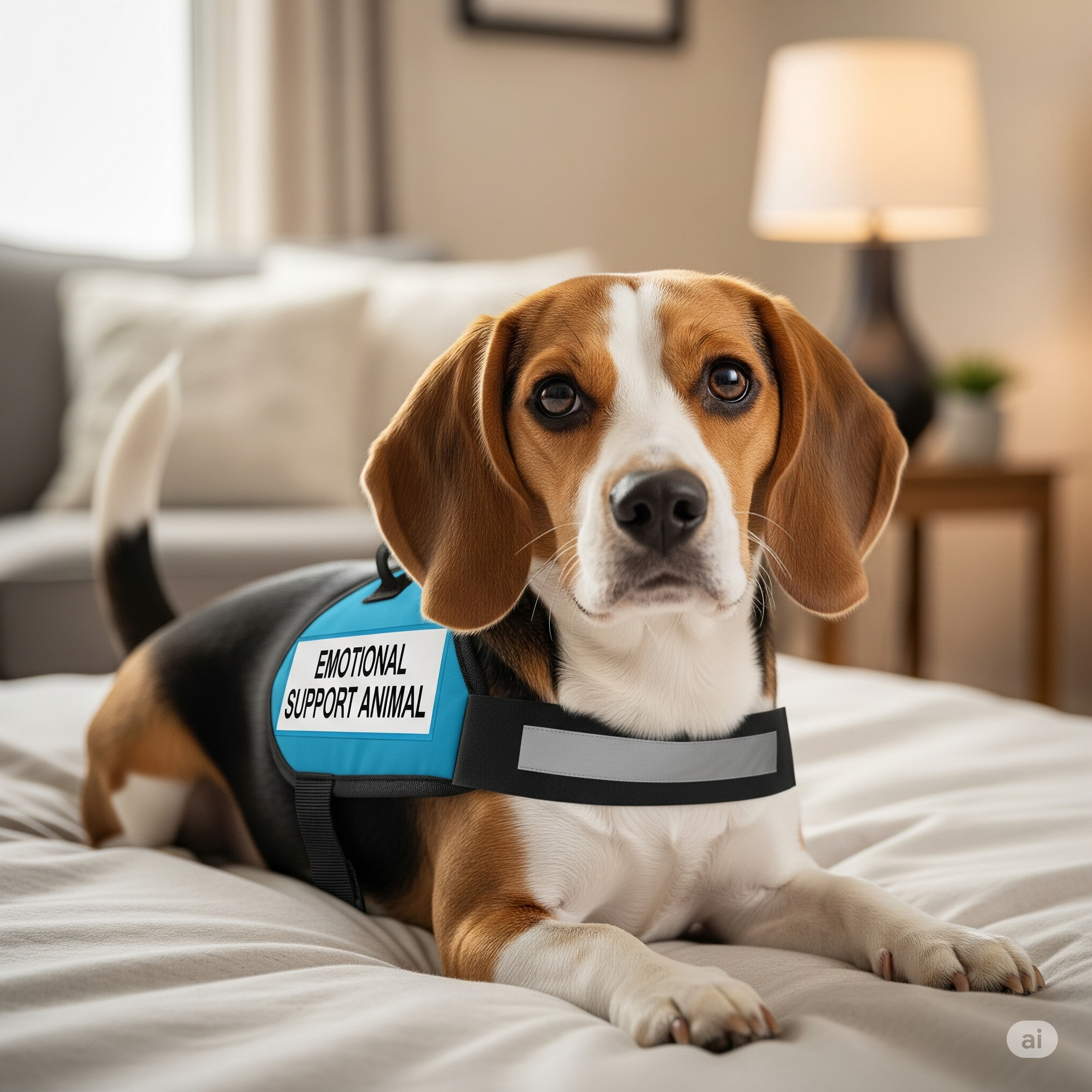Psychiatric Service Dogs (PSDs) are invaluable partners for individuals living with mental health disabilities, providing crucial support through specifically trained tasks. As the understanding and prevalence of PSDs grow, so do questions surrounding their “registration.” Many handlers and those considering getting a PSD understandably wonder about official procedures, necessary documentation, and whether a formal registry exists.
We will delve into the legal realities defined by the Americans with Disabilities Act (ADA), debunk common myths surrounding PSD registries and certifications, and provide practical guidance on what truly matters when it comes to legally recognized PSD status.
The Myth of the Psychiatric Service Dog Registry: Understanding the ADA
The most crucial point to understand right from the outset is that there is no official federal or state registry for Psychiatric Service Dogs (or any service dogs) in the United States. The Americans with Disabilities Act (ADA), the primary law protecting the rights of individuals with disabilities and their service animals, does not require service dogs to be registered, certified, or licensed.
This might come as a surprise to many, as the internet is rife with websites offering “official” service dog registrations and certifications for a fee. It’s vital to recognize that these private registries hold no legal weightunder the ADA. Possessing a certificate or ID card from such a registry does not confer any additional rights or protections under the law, and the absence of one does not diminish the rights of a legitimate PSD handler.
Why No Official Registry? The Philosophy Behind the ADA
The ADA’s stance against a national registry stems from several key principles:
- Focus on Function, Not Form: The ADA emphasizes what a service animal does (the specific tasks it is trained to perform to mitigate the handler’s disability) rather than a piece of paper declaring its status.
- Avoiding Unnecessary Barriers: Creating a mandatory registry could impose significant financial and administrative burdens on individuals with disabilities, potentially hindering their access to necessary service animals.
- Protecting Privacy: Requiring registration could lead to the collection and potential misuse of sensitive personal information about an individual’s disability.
- Preventing Discrimination: The focus on observable behavior and the two permissible inquiries under the ADA aims to prevent discrimination based on the lack of documentation.
The Two Permitted Questions: What Businesses Can Ask (and What They Can’t)
Instead of relying on registries, the ADA outlines a specific protocol for businesses and other public accommodations to determine if an animal is a legitimate service animal. When it is not readily apparent that an animal is a service animal, staff are only permitted to ask two questions:
- “Is the dog a service animal required because of a disability?”
- “What work or task has the dog been1 trained to perform?”
These questions are designed to2 be concise and respectful, focusing on the animal’s function without requiring the handler to disclose details about their disability.
What Businesses Cannot Ask:
It’s equally important to know the inquiries that are prohibited under the ADA:
- They cannot ask about the person’s disability.
- They cannot ask for any “proof” or “certification” for the service animal.
- They cannot demand that the service animal demonstrate its task.
- They cannot ask for medical documentation or a doctor’s note.
- They cannot require the service animal to wear a specific vest, tag, or harness.
Understanding these limitations empowers PSD handlers to confidently assert their rights when faced with inappropriate inquiries.
So, If There’s No Registry, What Does Matter for a Psychiatric Service Dog?
While you don’t need to “register” your PSD, several crucial elements determine its legitimacy and your rights under the ADA:
- The Definition of “Disability”: The handler must have a disability as defined by the ADA – a physical or mental impairment that substantially limits one or more major life activities.3 For a PSD, this refers to a diagnosed mental health condition.
- Individualized Training: The dog must be individually trained to perform specific tasks that directly assist with the handler’s disability. These tasks must be more than just general comfort or emotional support. Examples include:
- Interrupting self-harm behaviors
- Providing deep pressure therapy during anxiety attacks
- Medication reminders
- Grounding during dissociative episodes
- Alerting to panic attacks
- Creating a safe space in crowded environments
- The Dog’s Behavior: The service animal must be well-behaved in public. It should be under the handler’s control (leashed, tethered, or otherwise controlled) and not disruptive. A dog that barks excessively, jumps on people, or shows aggression can be asked to leave, regardless of its training.
Emotional Support Animals (ESAs) vs. Psychiatric Service Dogs (PSDs): A Critical Distinction
It’s essential to differentiate between Psychiatric Service Dogs and Emotional Support Animals (ESAs). While both can provide significant emotional benefits, ESAs do not have the same public access rights as service animals under the ADA.
The key difference lies in the specific task training. ESAs provide comfort and companionship simply by their presence. PSDs, on the other hand, are trained to perform specific actions that directly mitigate the handler’s psychiatric disability.
Therefore, the information in this blog post regarding the lack of a registry and the rights afforded under the ADA applies specifically to Psychiatric Service Dogs that meet the ADA’s definition of a service animal. ESAs are primarily recognized under the Fair Housing Act (FHA) for housing purposes and may have limited or no public access rights under state or local laws.
The Role of a Licensed Mental Health Professional (LMHP)
While the ADA doesn’t require documentation for public access, the process of obtaining a legitimate PSD often involves a Licensed Mental Health Professional (LMHP). An LMHP can:
- Diagnose your mental health condition: This is the first step in determining if you have a disability as defined by the ADA.
- Assess if a PSD would be a beneficial support: They can evaluate whether the specific tasks a PSD can be trained to perform would directly mitigate your disability.
- Provide a professional opinion letter: While not legally required for public access, a letter from your LMHP can be valuable for several reasons:
- Personal peace of mind: It can provide reassurance that your need for a PSD is professionally recognized.
- Housing and travel: While the ADA governs public access, other laws like the Fair Housing Act (FHA) and the Air Carrier Access Act (ACAA) have different requirements, and a letter from an LMHP may be necessary for ESAs and can be helpful in explaining the need for a PSD in these contexts.
- Addressing potential misunderstandings: In situations where you encounter persistent questioning or denial of access (though this is illegal under the ADA if your dog meets the definition of a service animal), a professional letter can provide additional context (though you are still not legally obligated to show it in most public access situations).
CertifyESA’s Role: CertifyESA facilitates connections with licensed mental health professionals who can conduct evaluations to determine if an ESA or PSD is appropriate for an individual’s needs. We provide a platform to help you navigate this process and obtain the necessary professional documentation if deemed appropriate. It’s important to understand that we do not “certify” service dogs, as no such legal certification exists. Instead, we help connect you with the professionals who can assess your needs and provide supporting documentation based on their professional judgment.
Practical Guidance for Living with a Psychiatric Service Dog
While “registration” isn’t the focus, here’s what truly matters when living with and taking your PSD in public:
- Invest in Thorough Training: Ensure your PSD is impeccably trained to perform its specific tasks and is well-behaved in all public settings. This includes obedience training and socialization.
- Carry Your Dog’s Leash and Waste Bags: Always be prepared to manage your dog responsibly.
- Know Your Rights (and Be Prepared to Educate): Familiarize yourself with the ADA guidelines regarding service animals and be prepared to calmly and politely educate others if they have questions or misconceptions.
- Consider Visual Identification (Optional): While not legally required, a vest, harness, or tag clearly identifying your dog as a “Service Dog” or “Psychiatric Service Dog” can sometimes help prevent unnecessary questions and misunderstandings. However, remember that the presence or absence of these items does not determine legal status.
- Maintain Your Dog’s Health Records: Keep your PSD up-to-date on vaccinations and regular veterinary care.
Navigating Online “Registries” and “Certifications”
Given the lack of official requirements, the abundance of online “service dog registries” and “certification” programs can be confusing and even misleading. Here’s what to keep in mind:
- They are not legally recognized: These registries and certifications do not grant any legal rights or protections under the ADA.
- They often come with a cost: You will typically pay a fee for these services, which ultimately provide no legal benefit in terms of public access.
- Be wary of guarantees: Avoid services that guarantee your animal will be recognized as a service dog simply by registering. True service animal status is based on the legal definition and the dog’s actual training and behavior.
- Focus on legitimate pathways: If you believe you need a PSD, focus on consulting with a licensed mental health professional and investing in proper training for your dog.
Conclusion: Empowering Yourself with Accurate Information
In conclusion, the concept of “registering” a Psychiatric Service Dog in the way one might register a pet is a misconception. The ADA does not require or recognize any official federal or state registry for service animals. What truly matters is whether your dog meets the ADA’s definition of a service animal: individually trained to perform specific tasks to mitigate your disability and well-behaved in public.
While you don’t need to “register” your PSD, understanding your rights under the ADA, ensuring your dog is properly trained, and (optionally) having documentation from a Licensed Mental Health Professional can empower you to navigate public spaces confidently. CertifyESA is dedicated to providing accurate information and facilitating connections with LMHPs to help individuals understand their needs and the potential benefits of ESAs and PSDs. Focus on education, proper training, and advocating for your rights based on the law, rather than relying on legally meaningless online registries.





